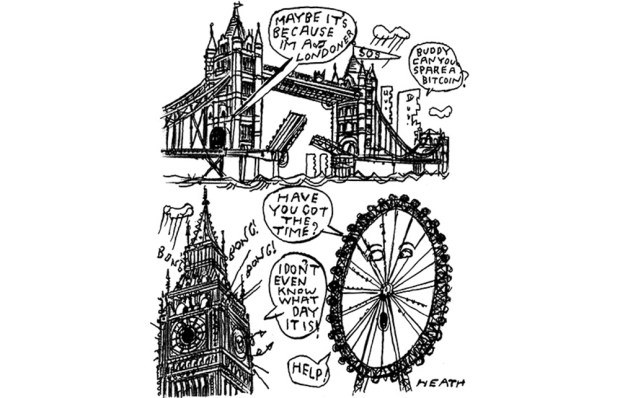The phrase ‘rich people’s problems’ has its uses. I once overheard a group in a Knightsbridge restaurant sympathising with a companion in tones fit for a bereavement or life-changing injury. ‘Oh, poor you!’ It turned out that their nanny had been ill for two days while they were in Zermatt, and that Farrow & Ball was temporarily unable to supply an obscure shade of paint.
To be fair, there are problems unique to the seriously rich. Take Marci Klein, daughter of Calvin. Not only was Marci kidnapped aged ten, but she later complained that in the midst of any passionate encounter with a new boyfriend, she would suddenly find herself confronted with her own dad’s name in inch-high letters. The 99 per cent never have to cope with anything like that.
So bear with me while I suggest that there might be a hidden downside to well-paid white-collar jobs — the very form of employment least affected by the pandemic.
It starts with the expansion of higher education. In theory, qualifications should expand your future opportunities; in reality they can limit them. Graduates find themselves compelled to justify the sunk-cost of time and money they’ve invested in education by applying only for graduate jobs. And such jobs are overwhelmingly found in large cities.
At first, no problem. Young people like cities. They are undergoing a temporary hormonal imbalance which makes crowds enjoyable. The jaws of the trap only begin closing ten years later. By then, their London job has specialised to such an extent that they are only employable in a huge mega-city. The trap closes further when they enter a relationship with someone similarly specialised; the odds of both finding lucrative employment anywhere else in the country are infinitesimal. Clang! The trap has closed.
And white-collar employment offers no lifestyle flexibility at all. Between 9 a.m. and 6 p.m. for five days a week you are stuck indoors. Non-office employment, by contrast, caters for a wide variety of tastes, You’re not confined to living in a city. You can work outdoors or in, sociably or reclusively. If you hate schedules, you can become a plumber or builder, and turn up only when the mood strikes. You might find a job to fit in with childcare. Or with a second job. ‘Are there many taxis late at night at East Croydon?’ my wife and I once asked a couple of fare-dodgers on the train, and were briefly puzzled by the answer: ‘There’s loads at the moment ’cos there’s a firemen’s strike on.’
Some people genuinely love London. I get that. But for many people it might have become, as a new emigrée recently proposed in Vice, a ‘cult’. So much mental and ritualistic effort has been invested in reciting the urbanist creed, you can no longer dis-believe. You are a victim of ‘adaptive preference formation’ or Stockholm syndrome; your tastes have been reverse-engineered to match the narrow confines of your options.
I was denied a press pass to the Rose Garden interview with Dominic Cummings, so all you got was boring questions about Barnard Castle. What I wanted to ask was this. ‘Dom, mate, you’re the architect of Brexit. Why in God’s name do you live in Islington? The baristas will gob in your coffee if you even blink. Knight Frank can sort you a five-bedroom rectory in Thanet for less money, and you’ll never have to pay for a pint for the rest of your life.’
Will Jonestown-on-Thames survive flexible working? I wonder. Things go full circle. My relationship with London is now like my grandfather’s relationship with Abergavenny: somewhere you go once a week on market day. Suits me fine.
Got something to add? Join the discussion and comment below.
Get 10 issues for just $10
Subscribe to The Spectator Australia today for the next 10 magazine issues, plus full online access, for just $10.
You might disagree with half of it, but you’ll enjoy reading all of it. Try your first month for free, then just $2 a week for the remainder of your first year.















Comments
Don't miss out
Join the conversation with other Spectator Australia readers. Subscribe to leave a comment.
SUBSCRIBEAlready a subscriber? Log in